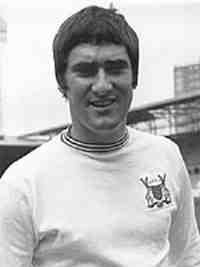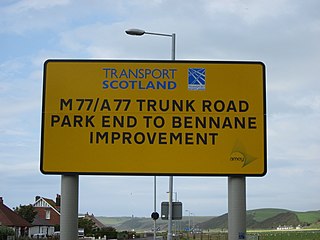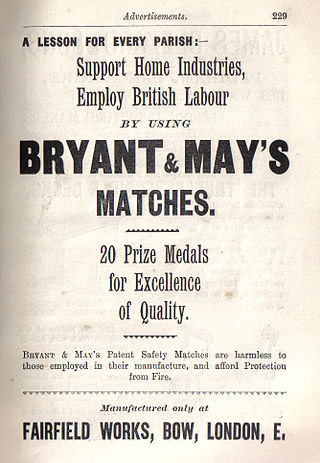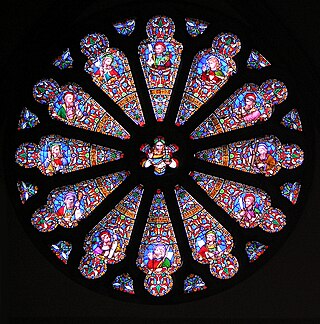
England's Glory is a brand of non-safety matches, available in the United Kingdom, using a celebrated image of a Victorian battleship, HMS Devastation.

England's Glory is a brand of non-safety matches, available in the United Kingdom, using a celebrated image of a Victorian battleship, HMS Devastation.
The product was originally made in the still-standing 'Moreland's Match Manufactory' in Bristol Road, Gloucester by S.J. Moreland and Sons, who became a subsidiary of Bryant and May in 1913, although full ownership by Bryant and May only came in 1938. [1]
Consolidation of match production within Great Britain led to Bryant and May's matches being made at Garston in Liverpool, London and Glasgow. England's Glory then became a brand for matches made at Bryant and May's Garston factory which were sold mainly in the North of England and the Midlands. [1] The matches made in Glasgow were marketed in Scotland as Scottish Bluebell matches. [1]
Bryant and May themselves ceased to exist in the 1980s, but England's Glory and Scottish Bluebell branded matches have stopped being manufactured in Sweden by the company Swedish Match (https://houseofswan.com/products/matches/#matches-range ) The modern England's Glory matchbox design is, however, not the previous design, which used to have jokes on the back, submitted by members of the public. One example was: 'A visitor to London, annoyed a cabbie by boastful comparisons of English and American buildings. When they reached the Thames, the American said, "Driver, what's that trickle?". Cabbie, "Heavens! My radiator has burst!"
The public house "England's Glory" in London Road, Gloucester is named after the matches.[ citation needed ]
The song "Senses Working Overtime" by XTC contains the spoken phrases "England's Glory" and "A striking beauty", the latter being a slogan associated with "England's Glory" matches.
The Macc Lads wrote a song called "England's Glory" referring to the matches.
The Welsh band Stereophonics took the lyric 'It only takes one tree to make a thousand matches but only takes one match to burn a thousand trees' for their hit song A Thousand Trees from the back of a box of England's Glory matches. [2]
Various re-issues of English pub-rock performer Ian Dury's 1977 album "New Boots and Panties" contain a live version of his composition "England's Glory".
On 7 November 1881, the ship England's Glory was wrecked off Nelson, New Zealand, by getting too close in while waiting the arrival of the pilot. [3] (See List of shipwrecks of Oceania).

Buckfast Tonic Wine is a caffeinated alcoholic drink consisting of fortified wine with added caffeine, originally made by monks at Buckfast Abbey in Devon, England. It is now made under a licence granted by the monastery, and distributed by J. Chandler & Company in Great Britain, James E McCabe Ltd in Northern Ireland, and Richmond Marketing Ltd in Ireland. It is based on a traditional recipe from France. The wine's distributor reported record sales of £43.2 million as of March 2017.

Andrew Watson was a Scottish footballer who is widely considered to be the first black person to play association football at international level. He played three matches for Scotland between 1881 and 1882. Arthur Wharton was previously commonly thought to be the first black player, as he was the first black professional footballer to play in the Football League, but Watson's career predated him by over a decade. There is evidence that Watson was paid professionally when at Bootle in 1887, two years prior to Wharton becoming a professional with Rotherham Town; however, the Merseyside club did not play in the Football League at the time Watson played there.

Kelvingrove Park is a public park located on the River Kelvin in the West End of the city of Glasgow, Scotland, containing the Kelvingrove Art Gallery and Museum.

James Curran Baxter was a Scottish professional footballer who played as a left half. He is generally regarded as one of the country's greatest ever players. He was born, educated and started his career in Fife, but his peak playing years were in the early 1960s with the Glasgow club Rangers, whom he helped to win ten trophies between 1960 and 1965, and where he became known as "Slim Jim". However, he started drinking heavily during a four-month layoff caused by a leg fracture in December 1964, his fitness suffered, and he was transferred to Sunderland in summer 1965. In two and a half years at Sunderland he played 98 games and scored 12 goals, becoming known for drinking himself unconscious the night before a match and playing well the next day. At the end of 1967 Sunderland transferred him to Nottingham Forest, who gave him a free transfer back to Rangers in 1969 after 50 games. After a further year with Rangers Baxter retired from football in 1970, at the age of 31.

The transport system in Scotland is generally well-developed. The Scottish Parliament has control over most elements of transport policy within Scotland, with the Cabinet Secretary for Transport, Net Zero and Just Transition holding portfolio responsibility within the Scottish Government. Transport Scotland is the Executive Agency responsible for the Scottish transport network.

Bryant & May was a British match manufacturer, which today only exists as a brand name owned by Swedish Match. The company was formed in the mid-19th century as a dry goods trader, with its first match works, the Bryant & May Factory, located in Bow, London. It later opened other factories in the United Kingdom, Australia, and other parts of the world.
The Bluebells are a Scottish indie new wave band, active between 1981 and 1986.

William Wailes (1808–1881) was the proprietor of one of England's largest and most prolific stained glass workshops.
The 1973–74 British Home Championship Home Nations football tournament was, like the two championships which preceded it, subject to rescheduled matches due to The Troubles in Northern Ireland. Scotland, who should have visited Belfast to play their match against Northern Ireland, instead hosted the game in Glasgow as the previous years solution of matches being played in Liverpool was not taken up. Bereft of home advantage, the Irish struggled to contain their opponents, although they did begin well with a narrow win over the Scots. In their first matches, England enjoyed their home advantage to claim victories over the Welsh and Irish while the Welsh crashed to defeat against England and Scotland. With the confusing schedule, by the final match England seemed to be favourites, only needing a draw with the Scots in Glasgow to claim the championship while a loss would still tie the series. The Northern Irish, who could still have sneaked the championship themselves, lost a close game to the Welsh, leaving England and Scotland to battle for the final placements, the Scots reaching parity in the competition thanks to a 2–0 victory.
The 1957–58 British Home Championship was a football tournament played between the British Home Nations during the 1957–58 season. The competition was marred by the Munich air disaster on 6 February 1958, when an aircraft carrying the Manchester United football team home from a European Cup match in Belgrade crashed at the Munich-Riem airport on take-off. Eight players and fifteen other people, including an array of senior coaches, officials and sports journalists, were killed and another nineteen seriously injured. Three of the dead, Roger Byrne, Tommy Taylor and Duncan Edwards were experienced England team members while Jackie Blanchflower, an Ireland international, was left permanently disabled. Several other international footballers were also injured more or less severely. This tragedy rather subdued the tournament culmination two months later, although the England team did secure a cathartic 4–0 victory in Glasgow over the Scots with one of the goals coming from Bobby Charlton, who had been injured in the Munich crash.

The 1872 association football match between the national teams of Scotland and England is officially recognised by FIFA as the sport's first international. It took place on 30 November 1872 at Hamilton Crescent, the West of Scotland Cricket Club's ground in Partick, Glasgow. The match was watched by 4,000 spectators and finished as a 0–0 draw.
Between 1870 and 1872, the Football Association (FA) organised five representative association football matches between teams representing England and Scotland, all held in London. The first of these matches was held at The Oval on 5 March 1870, and the fifth was on 21 February 1872. The matches, which were organised by Charles W. Alcock, are the precursors to modern international football and were referred to as internationals at the time. They are not recognised, however, as full internationals by FIFA as the players competing in the Scotland team were drawn only from London-based Scottish players. They were followed by the 1872 match in Glasgow between Scotland and England which is recognised as the first international match.
The Football World Championship, also known as the United Kingdom Championship or the International Club Championship, was a exhibition association football match played between the English and Scottish club champions on a regular, but not annual, basis in the late 19th and early 20th centuries, with varying degrees of press attention and public interest. Perhaps the most widely publicised at the time under the 'World Championship' name was the 1888 event between Renton and West Bromwich Albion, while in the modern age interest from historians has drawn more attention to matches involving Sunderland, particularly the 1895 match. The FA Cup and Scottish Cup were qualification of the tournament.

The Mersey Match Factory, later known as The Matchworks, is a former match factory on Speke Road, Garston, Liverpool, England. The factory closed in 1994, and has since been converted into offices and workshops. It had opened in 1921, having been built for Maguire, Paterson and Palmer, and later used by Bryant and May. The factory was the first building in the United Kingdom to be constructed using the flat-slab concrete technique. It is recorded in the National Heritage List for England as a designated Grade II listed building.
Andrew Davidson is a Scottish rugby union player at the Lock position. He currently plays for Gloucester having previously played for Glasgow Warriors, London Scottish, Newcastle Falcons and Edinburgh Rugby.

The Scotland national B rugby union team was one of several national rugby union teams behind the Scottish national side. It was largely used as a development side and began in the era when Scotland had little in the way of an age-grade pathway.

Adam Hastings is a Scotland international rugby union player who plays for Gloucester Rugby at the Fly-half position. He is the son of World Rugby Hall of Fame full-back Gavin Hastings.
Kinning Park was a 19th-century sports ground in Kinning Park, Renfrewshire, Scotland, primarily used for cricket and football. It was the home of Clydesdale Cricket Club from 1849, staging a number of important matches against visiting English teams. It was also the original home of the club's football team, Clydesdale F.C. When both teams relocated to Titwood in 1876, Kinning Park was taken over by Rangers F.C., who played there until moving to the first Ibrox Park in 1887. The ground was the venue for the 1881 Scottish Cup Final between Queen's Park and Dumbarton.
Possil Bluebell Football Club was a 19th-century football club from the Possilpark area of Glasgow in Scotland.
Plains Blue Bell Football Club was a Scottish association football club based in the village of Plains, Lanarkshire.